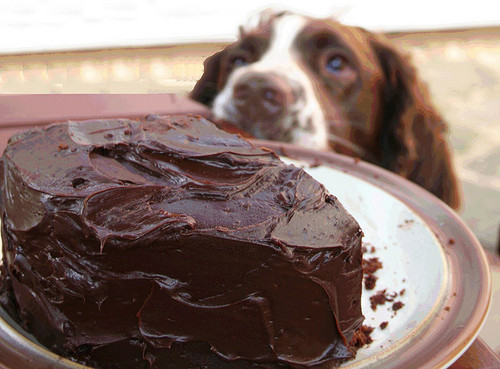Decorations, visitors, new foods, candy, chaos…the holidays bring a unique set of challenges for your pet’s health. While some dogs may be as bold as to steal the turkey off the table, most are likely chewing on decorations and vacuuming up dropped scraps. Cats, too, love those new tinsel additions to your home. Here are the top claimed medical conditions that Veterinary Pet Insurance Company reports every holiday season. These health problems cost pet owners a total of 22.8 million.
You may already know that cats, dogs and chocolate don’t mix, but there are many other food holiday health hazards for pets. The top four pet health problems are caused by pets eating “people” food and/or the stress of visitors and the disruption of daily routines. The most common is vomiting (gastritis), then diarrhea (enteritis), loose or bloody stool (colitis), and finally pancreatitis (inflammation of the pancreas). The first three are easy to spot, and when present together may indicate the last. Pancreatitis is a severe medical condition brought on by eating fatty foods and is potentially fatal, so be sure to bring your pet in to see a vet if she has any of these symptoms.
Of course, pets are known to eat non-food items almost as often as food. Three famous cases include a deflated soccer ball, fifteen pacifiers, and 15″ serrated knife (all dogs survived). The fifth most common pet health problem during the holidays is called “gastric foreign body – medical.” This means that your pet has eaten a non-digestible item such as decorations, ribbon, small toys and bones from holiday meats. In some cases, the object may need surgery to remove it from the stomach or intestines. These procedures can set you back thousands of dollars.
Last but not least we come to methylxanthine toxicity, the scientific name for chocolate poisoning. Dogs have a big sweet tooth and are more prone to eating the treats than cats, which do not taste sweetness. At the same time, dogs and chocolate aren’t the only problems. Other food products that contain caffeine and methylxanthine (for example, coffee) are toxic to both dogs and cats.
Keep your pets healthy this holiday season by reducing temptation. Place bowls of candy and food on high tables out of your dogs reach, or better, don’t leave them out in unsupervised rooms. Give your pet appropriate toys and attention to keep your pets from becoming bored and finding something dangerous to play with. And of course, take time from the stress and chaos of holiday activities to check in with your pet. Is she lethargic, nauseous, or her usual self? Don’t hesitate to go see your vet if anything feels off.

